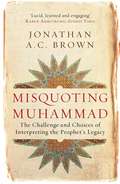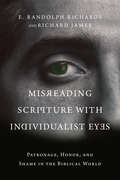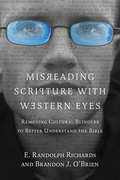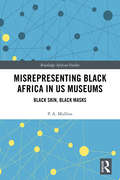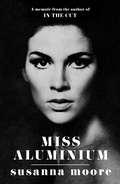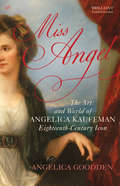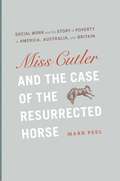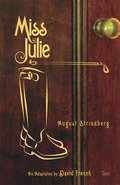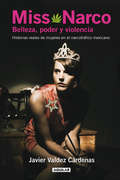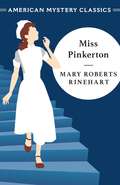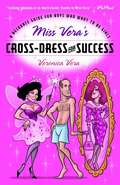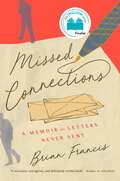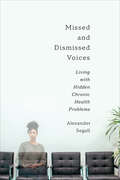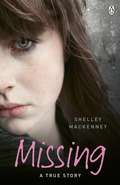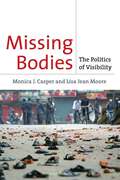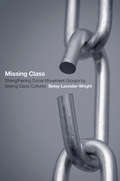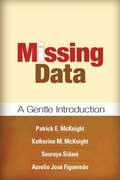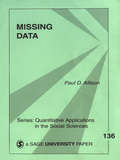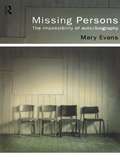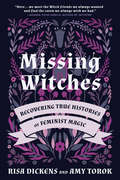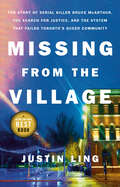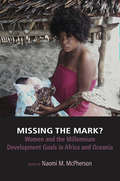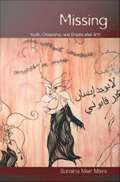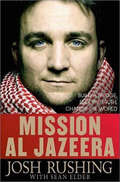- Table View
- List View
Misquoting Muhammad: The Challenge And Choices Of Interpreting The Prophet's Legacy (Islam in the Twenty-First Century)
by Jonathan A. C. BrownFew things provoke controversy in the modern world like the religion brought by Muhammad. Modern media are replete with alarm over jihad, underage marriage and the threat of amputation or stoning under Shariah law. Sometimes rumor, sometimes based in fact and often misunderstood, the tenets of Islamic law and dogma were not set in the religion’s founding moments. They were developed over centuries by the clerical class of Muslim scholars. Misquoting Muhammad takes the reader back in time through Islamic civilization and traces how and why such controversies developed, offering an inside view into how key and controversial aspects of Islam took shape. From the protests of the Arab Spring to Istanbul at the fall of the Ottoman Empire, and from the ochre red walls of Delhi’s great mosques to the trade routes of Islam’s Indian Ocean world, Misquoting Muhammad lays out how Muslim intellectuals have sought to balance reason and revelation, weigh science and religion, and negotiate the eternal truths of scripture amid shifting values.
Misreading Scripture with Individualist Eyes: Patronage, Honor, and Shame in the Biblical World
by Richard James E. Randolph RichardsThe Bible was written within collectivist cultures. When Westerners, immersed in individualism, read the Bible, it's easy to misinterpret important elements—or miss them altogether. In any culture, the most important things usually go without being said. So to read Scripture well we benefit when we uncover the unspoken social structures and values of its world. We need to recalibrate our vision. Combining the expertise of a biblical scholar and a missionary practitioner, Misreading Scripture with Individualist Eyes is an essential guidebook to the cultural background of the Bible and how it should inform our reading. E. Randolph Richards and Richard James explore deep social structures of the ancient Mediterranean—kinship, patronage, and brokerage—along with their key social tools—honor, shame, and boundaries—that the biblical authors lived in and lie below the surface of each text. From Abraham, Sarah, and Hagar to Peter's instructions to elders, the authors strip away individualist assumptions and bring the world of the biblical writers to life. Expanding on the popular Misreading Scripture with Western Eyes, this book makes clear how understanding collectivism will help us better understand the Bible, which in turn will help us live more faithfully in an increasingly globalized world.
Misreading Scripture with Western Eyes: Removing Cultural Blinders to Better Understand the Bible
by E. Randolph Richards Brandon J. O'BrieneconomicSome readers might assume that Moses married "below himself" because his wife was a dark-skinned Cushite. Actually, Hebrews were the slave race, not the Cushites, who were highly respected. Aaron and Miriam probably thought Moses was being presumptuous by marrying "above himself."Western individualism leads us to assume that Mary and Joseph traveled alone to Bethlehem. What went without saying was that they were likely accompanied by a large entourage of extended family.
Misrepresenting Black Africa in U.S. Museums: Black Skin, Black Masks (Routledge African Studies)
by P.A. MullinsThis book is an examination of race, Black African objects, identity, museums at the turn of the 19th century in the U.S. via the history of the earliest collectors of Black African objects in the U.S.. Misrepresenting Black Africa in American Museums explores black identity as a changing, nuanced concept. Focusing on racial history in the United States, this book examines two of the earliest collectors of Black African objects in the United States. First, there is a history of race and ideas of primitiveness is presented. Next, there is a discussion of western concepts of race. Then there is an examination of Karl Steckelmann, the first collector who is a united states citizen. After which there is a critical account of William H. Sheppard, the second collector who is also a black Presbyterian Minister from Virginia. Then a broader discussion of public appearances of Black African images in public. This is followed by a detailed look at museum formation and practices. Next, there is a theoretical discussion of identity and race, and finally, a look at the impact of historical practices that continue into the 21st century. This book will be of interest to scholars of race and racism, African visual culture, heritage and museum studies.
Miss Aluminium: ONE OF THE SUNDAY TIMES' 100 BEST SUMMER READS OF 2020
by Susanna MooreONE OF THE SUNDAY TIMES' 100 BEST SUMMER READS OF 2020'Unlike any Hollywood memoir you'll have read' Metro'It's hard to beat Susanna Moore's Miss Aluminium' Vogue'A sharp-edged summery treat' Hadley FreemanAt seventeen, Susanna Moore left her home in Hawai'i, with no money, no belongings and no prospects. But in Philadelphia, an unexpected gift of four trunks of beautiful clothes allowed her to assume the first of many disguises. Her journey takes her from New York to Los Angeles where she becomes a model and meets Joan Didion and Audrey Hepburn. She works as a script reader for Warren Beatty and Jack Nicholson, and is given a screen test by Mike Nichols. But beneath Miss Aluminium's glittering fairytale surface lies the story of a girl's insatiable hunger to learn. Moore gives us a sardonic, often humorous portrait of Hollywood in the seventies and of a young woman's hard-won arrival at selfhood.
Miss Angel: The Art and World of Angelica Kauffman, Eighteenth-Century Icon
by Angelica GooddenA word was coined to describe the condition of people stricken with a new kind of fever when the Swiss-born artist Angelica Kauffman (1741-1807) came to London in 1766. 'The whole world', it was said, 'is Angelicamad.' One of the most successful women artists in history - a painter who possessed what her friend Goethe called an 'unbelievable' and 'massive' talent - Kauffman became the toast of Georgian England, captivating society with her portraits, mythological scenes and decorative compositions. She knew and painted poets, novelists and playwrights, collaborating with them and illustrating their work; her designs adorned the houses of the Grand Tourists she had met and painted in Italy; actors, statesmen, philosophers, kings and queen sat to her; and she was the force that launched a thousand engravings. Despite rumours of relationships with other artists (including Sir Joshua Reynolds), and an apparently bigamous and annulled first marriage to a pseudo Count, Kauffman was adopted by royalty in England and abroad as a model of social and artistic decorum. A profoundly learned artist, but one who is loved, above all, for her tender adaptations from classical antiquity and sentimental literature; a commercially successful celebrity yet also a founding member of The Royal Academy of arts; the virginal creator of sexually ambivalent beings who was one of the hardest-headed businesswomen of her age, Kauffman's life and work is full of apparent contradictions explored in this first biography in over 80 years.
Miss Cutler & the Case of the Resurrected Horse
by Mark PeelSocial workers produced thousands of case files about the poor during the interwar years. Analyzing almost two thousand such case files and traveling from Boston, Minneapolis, andaPortland to London and Melbourne, "Miss Cutler and the Case of the Resurrected Horse" is a pioneering comparative study that examines how these stories of poverty were narrated and reshaped by ethnic diversity, economic crisis, and war. Probing the similarities and differences in the ways Americans, Australians, and Britons understood and responded to poverty, Mark Peel draws a picture of social work that is based in the sometimes fraught encounters between the poor and their interpreters. He uses dramatization to bring these encounters to lifeOCojoining Miss Cutler and that resurrected horse are Miss Lindstrom and the fried potatoes and Mr. OOCONeil and the seductive clientOCoand to give these people a voice. Adding new dimensions to the study of charity and social work, this book is essential to understanding and tackling poverty in the twenty-first century.
Miss Julie
by David French August StrindbergDavid French's adaptation of August Strindberg's disturbing and enduring drama of the transgressive affair between the daughter of a count and the count's man-servant has an eerie contemporary feel about it. French has sharpened the psychodramas of the original - scenes of desire, anger, jealousy, coercion, manipulation, exploitation, arrogance, dominance, submission, and deceit. Cast of 2 women and 1 man.
Miss Narco
by Javier Valdez CárdenasTestimonios conmovedores y terribles de mujeres que, por decisión propia o por azares del destino, vivieron las consecuencias de encontrarse cara a cara con el mundo del narcotráfico. De Javier Valdez Cárdenas, Premio Internacional a la Libertad de Expresión, el autor de Los morros del narco. Obra finalista del Premio Rodolfo Walsh. Belleza, poder y violencia. Historias reales de mujeres en el narcotráfico mexicano. Javier Valdez ofrece un libro impactante que va del reportaje a la crónica para rescatar del silencio, de la nota roja y del olvido, a numerosas mujeres que viven entre las balas momentos cruciales de su vida. Amantes de capos, amigas de ellos o familiares, son mujeres con una verdad ardiente y dolorosa, que buscan el glamour y la hermosura, el poder económico y la huida de su realidad; mujeres que viven en el límite de la ley, la violencia y de la muerte.
Miss Pinkerton (The\hilda Adams Mysteries Ser. #1)
by Mary Roberts Rinehart'A literary celebrity with few rivals ... she wrote more bestselling novels ... over a longer period than almost any other American writer' WASHINGTON POSTEveryone agrees that Herbert Wynne wasn't the type to commit suicide. But he has been found, shot dead, the only other possible killer his bedridden aunt.Inspector Patton of the Homicide Division sees this as the perfect opportunity to send in Hilda Adams, a nurse with a very special talent for detection. But when the sleuthing nurse arrives at the mansion, she finds more intrigue than anyone outside could possibly have imagined - and a killer on the loose...
Miss Vera's Cross-Dress for Success: A Resource Guide for Boys Who Want to Be Girls
by Veronica VeraVeronica Vera, creator and founder of the world's first cross-dressing academy, knows that a host of goods and services for the girl with something extra are just a mouse click away. But who wants to spend hours surfing the Net? Fear no more: Miss Vera has done the legwork, combing the Internet for irresistible and fun fashions, friendly social groups, and time-tested beauty tips for cross-dressers and trannies of every stripe.
Missed Connections: A Memoir in Letters Never Sent
by Brian FrancisAn entertaining and moving memoir about coming out, looking inwards, and the search for connection, inspired by the responses to a personal ad. A Loan Stars Top 10 Pick of the Month and one of Daily Hive's 10 Essential LGBTQ2+ Books to Celebrate Pride. In 1992, Brian Francis placed a personal ad in a local newspaper. He was a twenty-one-year-old university student, still very much in the closet, and looking for love. He received twenty-five responses, but there were thirteen letters that went unanswered and spent years tucked away, forgotten, inside a cardboard box. Now, nearly thirty years later, and at a much different stage in his life, Brian has written replies to those letters. Using the letters as a springboard to reflect on all that has changed for him as a gay man over the past three decades, Brian's responses cover a range of topics, including body image, aging, desire, the price of secrecy, and the courage it takes to be unapologetically yourself. Missed Connections is an open-hearted, irreverent, often hilarious, and always bracingly honest examination of the pieces of our past we hold close -- and all that we lose along the way. It is also a profoundly affecting meditation on how Brian's generation, the queer people who emerged following the generation hit hardest by AIDS, were able to step out from the shadows and into the light. In an age when the promise of love is just a tap or swipe away, this extraordinary memoir reminds us that our yearning for connection and self-acceptance is timeless.
Missed and Dismissed Voices: Living with Hidden Chronic Health Problems
by Alexander Segall PhDThere is a complex relationship between illness and identity. Missed and Dismissed Voices aims to expose the impact of hidden health problems on the daily lives of a growing number of adults who live with chronic conditions and repeatedly face the challenge of trying to maintain their personal sense of healthiness across the life course. The book focuses on the meaning and management of both medically diagnosed chronic diseases and medically unexplained physical conditions or syndromes. In each case, people must decide whether to make their private suffering public. The book includes analysis derived from research literature, combined with illness narrative accounts of people in qualitative interviews and blog posts, to create fictional exemplary case studies for each of the chronic conditions examined. The common issues raised in these stories provide important insights into the process by which people manage to adapt to their changing health status and life circumstances. In this book, Alexander Segall, PhD, gives voice to chronically ill people who often have their life stories either missed or dismissed.
Missing
by Shelley MacKenneyMissing is Shelley MacKenney's remarkable story of life as a 'missing person'. An inspirational tale of her journey through extreme personal crisis."You can run, but you can't hide from yourself."Abandoned by her mother as a young child and with a father constantly on the run, Shelley's life was never normal. Her family's involvement with South London's criminal underworld left her isolated, vulnerable and lonely. Falling deeper and deeper into depression and despair - she snapped.Shelley got on the first coach out of London with only the clothes she stood up in and £30 in her pocket. She didn't care where she was going, as long as she could disappear completely from her oppressive life. For years, she lived anonymously in refuges, hostels and on the streets. It would take something remarkable to bring her back to the real world.
Missing Bodies: The Politics of Visibility (Biopolitics #2)
by Lisa Jean Moore Monica CasperWe know more about the physical body—how it begins, how it responds to illness, even how it decomposes—than ever before. Yet not all bodies are created equal, some bodies clearly count more than others, and some bodies are not recognized at all. In Missing Bodies, Monica J. Casper and Lisa Jean Moore explore the surveillance, manipulations, erasures, and visibility of the body in the twenty-first century. The authors examine bodies, both actual and symbolic, in a variety of arenas: pornography, fashion, sports, medicine, photography, cinema, sex work, labor, migration, medical tourism, and war. This new politicsof visibility can lead to the overexposure of some bodies—Lance Armstrong, Jessica Lynch—and to the near invisibility of others—dead Iraqi civilians, illegal immigrants, the victims of HIV/AIDS and "natural" disasters.Missing Bodies presents a call for a new, engaged way of seeing and recovering bodies in a world that routinely, often strategically,obscures or erases them. It poses difficult, even startling questions: Why did it take so long for the United States media to begin telling stories about the "falling bodies" of 9/11? Why has the United States government refused to allow photographs or filming of flag-draped coffins carrying the bodies of soldiers who are dying in Iraq? Why are the bodies of girls and women so relentlessly sexualized? By examining the cultural politics at work in such disappearances and inclusions of the physical body the authors show how the social, medical and economic consequences of visibility can reward or undermine privilege in society.
Missing Class
by Betsy Leondar-WrightMany activists worry about the same few problems in their groups: low turnout, inactive members, conflicting views on racism, overtalking, and offensive violations of group norms. But in searching for solutions to these predictable and intractable troubles, progressive social movement groups overlook class culture differences. In Missing Class, Betsy Leondar-Wright uses a class-focused lens to show that members with different class life experiences tend to approach these problems differently. This perspective enables readers to envision new solutions that draw on the strengths of all class cultures to form the basis of stronger cross-class and multiracial movements. The first comprehensive empirical study of US activist class cultures, Missing Class looks at class dynamics in 25 groups that span the gamut of social movement organizations in the United States today, including the labor movement, grassroots community organizing, and groups working on global causes in the anarchist and progressive traditions. Leondar-Wright applies Pierre Bourdieu's theories of cultural capital and habitus to four class trajectories: lifelong working-class and poor; lifelong professional middle class; voluntarily downwardly mobile; and upwardly mobile. Compellingly written for both activists and social scientists, this book describes class differences in paths to activism, attitudes toward leadership, methods of conflict resolution, ways of using language, diversity practices, use of humor, methods of recruiting, and group process preferences. Too often, we miss class. Missing Class makes a persuasive case that seeing class culture differences could enable activists to strengthen their own groups and build more durable cross-class alliances for social justice.
Missing Data
by Patrick Mcknight Katherine McknightWhile most books on missing data focus on applying sophisticated statistical techniques to deal with the problem after it has occurred, this volume provides a methodology for the control and prevention of missing data. In clear, nontechnical language, the authors help the reader understand the different types of missing data and their implications for the reliability, validity, and generalizability of a study's conclusions. They provide practical recommendations for designing studies that decrease the likelihood of missing data, and for addressing this important issue when reporting study results. When statistical remedies are needed--such as deletion procedures, augmentation methods, and single imputation and multiple imputation procedures--the book also explains how to make sound decisions about their use. Patrick E. McKnight's website offers a periodically updated annotated bibliography on missing data and links to other Web resources that address missing data.
Missing Data (Quantitative Applications in the Social Sciences)
by Paul D. AllisonSooner or later anyone who does statistical analysis runs into problems with missing data in which information for some variables is missing for some cases. Why is this a problem? Because most statistical methods presume that every case has information on all the variables to be included in the analysis. Using numerous examples and practical tips, this book offers a nontechnical explanation of the standard methods for missing data (such as listwise or casewise deletion) as well as two newer (and, better) methods, maximum likelihood and multiple imputation. Anyone who has been relying on ad-hoc methods that are statistically inefficient or biased will find this book a welcome and accessible solution to their problems with handling missing data.
Missing Data (Quantitative Applications in the Social Sciences)
by Paul D. AllisonSooner or later anyone who does statistical analysis runs into problems with missing data in which information for some variables is missing for some cases. Why is this a problem? Because most statistical methods presume that every case has information on all the variables to be included in the analysis. Using numerous examples and practical tips, this book offers a nontechnical explanation of the standard methods for missing data (such as listwise or casewise deletion) as well as two newer (and, better) methods, maximum likelihood and multiple imputation. Anyone who has been relying on ad-hoc methods that are statistically inefficient or biased will find this book a welcome and accessible solution to their problems with handling missing data.
Missing Persons: The Impossibility of Auto/Biography
by Mary EvansAuto/biography is currently one of the most popular literary genres, widely supposed to illuminate the study of the individual and his or her personal circumstances. Missing Persons suggests that auto/biography is, in fact, based on fictions, both about the person and about what it is possible to know about any one individual.Organised into chapters which consider particular kinds of auto/biographical writing, such as work on the British Royal Family and auto/biographies of twentieth-century men, this book demonstrates the absences and evasions - indeed the `missing persons - of auto/biography. Mary Evans' book will provide invaluable reading for students of womens studies, sociology and cultural studies courses.
Missing Witches: Recovering True Histories of Feminist Magic
by Risa Dickens Amy TorokA guide to invocations, rituals, and histories at the intersection of magic and feminism, as informed by history's witches--and the sociopolitical culture that gave rise to them.When you start looking for witches, you find them everywhere. As seekers and practitioners reclaim and restore magic to its rightful place among powerful forces for social, personal, and political transformation, more people than ever are claiming the identity of "Witch." But our knowledge of witchcraft and magic has been marred by erasure, sensationalism, and sterilization, the true stories of history's witches left untold.Through meditations, stories, and practices, authors Risa Dickens and Amy Torok offer an intersectional, contemporary lens for uncovering and reconnecting with feminist witch history. Sharing traditions from all over the world--from Harlem to Haiti, Oaxaca to Mesopotamia--Missing Witches introduces readers to figures like Monica Sjoo, HP Blavatsky, Maria Sabina, and Enheduanna, shedding light on their work and the cultural and sociopolitical contexts that shaped it. Structured around the 8 sabbats of the Wheel of the Year, each chapter includes illustrations by Amy Torok, as well as invocations, rituals, and offerings that incorporate the authors' own wisdom, histories, and journeys of trauma, loss, and empowerment. Missing Witches offers an inside look at the vital stories of women who have practiced--and lived--magic.
Missing from the Village.: The Story of Serial Killer Bruce McArthur, the Search for Justice, and the System That Failed Toronto's Queer Community
by Justin LingThe tragic and resonant story of the disappearance of eight men--the victims of serial killer Bruce McArthur--from Toronto's queer community.In 2013, the Toronto Police Service announced that the disappearances of three men--Skandaraj Navaratnam, Abdulbasir Faizi, and Majeed Kayhan--from Toronto's gay village were, perhaps, linked. When the leads ran dry, the investigation was shut down, on paper classified as "open but suspended." By 2015, investigative journalist Justin Ling had begun to retrace investigators' steps, convinced there was evidence of a serial killer. Meanwhile, more men would go missing, and police would continue to deny that there was a threat to the community. On January 18, 2018, Bruce McArthur, a landscaper, would be arrested on suspicion of first-degree murder. In February 2019, he was sentenced to life in prison for the murders of eight men. This extraordinary book tells the complete story of the McArthur murders. Based on more than five years of in-depth reporting, this is also a story of police failure, of how the queer community responded, and the story of the eight men who went missing and the lives they left behind. In telling that story, Justin Ling uncovers the latent homophobia and racism that kept this case unsolved and unseen. This gripping book reveals how police agencies across the country fail to treat missing persons cases seriously, and how policies and laws, written at every level of government, pushed McArthur's victims out of the light and into the shadows.
Missing the Mark? Women and the Millennium Development Goals in Africa and Oceania
by Naomi M. McPhersonIn the year 2000, United Nations world leaders set out eight targets, the UN Millennium Development Goals, for achieving improved standards of living at the micro level in poorer nations around the globe, by the year 2015. The papers in this collection present fine-detailed ethnographic studies of cultures in Africa and Oceania, with a focus primarily on MDG 3, targeted to “promote gender equality and empower women” and MDG 5, targeted to “improve maternal health” to ascertain whether or not these goals have made or missed their mark. Ethnographic case studies located in Solomon Islands, Marshall Islands, Federated States of Micronesia, Papua New Guinea, Vanuatu, Ghana, Malawi, Cameroon, and South Ethiopia show that women in these cultures, regardless of nation state, face the same issues or problems—lack of empowerment, gender inequities, and inadequate access to cultural or state resources—to realize good health in general and good maternal and reproductive health, in particular.
Missing: Youth, Citizenship, and Empire After 9/11
by Sunaina Marr MairaIn Missing, Sunaina Marr Maira explores how young South Asian Muslim immigrants living in the United States experienced and understood national belonging (or exclusion) at a particular moment in the history of U. S. imperialism: in the years immediately following September 11, 2001. Drawing on ethnographic research in a New England high school, Maira investigates the cultural dimensions of citizenship for South Asian Muslim students and their relationship to the state in the everyday contexts of education, labor, leisure, dissent, betrayal, and loss. The narratives of the mostly working-class youth she focuses on demonstrate how cultural citizenship is produced in school, at home, at work, and in popular culture. Maira examines how young South Asian Muslims made sense of the political and historical forces shaping their lives and developed their own forms of political critique and modes of dissent, which she links both to their experiences following September 11, 2001, and to a longer history of regimes of surveillance and repression in the United States. Bringing grounded ethnographic analysis to the critique of U. S. empire, Maira teases out the ways that imperial power affects the everyday lives of young immigrants in the United States. She illuminates the paradoxes of national belonging, exclusion, alienation, and political expression facing a generation of Muslim youth coming of age at this particular moment. She also sheds new light on larger questions about civil rights, globalization, and U. S. foreign policy. Maira demonstrates that a particular subjectivity, the "imperial feeling" of the present historical moment, is linked not just to issues of war and terrorism but also to migration and work, popular culture and global media, family and belonging.
Mission Al Jazeera
by Sean Elder Josh RushingBlending his riveting personal story with innovative ideas about how to win the war on terror, former marine turned Al Jazeera reporter Josh Rushing addresses all the issues he was not allowed to talk about when he was in uniform. If we are to win the war on terror, Rushing explains, we have to interact with the media at home and abroad in order to control the way we are perceived. By refusing to appear on Al Jazeera, Western leaders allow people who disagree with the current administration to represent the West to the Arab world in a skewed, negative way. By taking readers inside Al Jazeera, Rushing offers a unique behind-the-scenes look at the controversial news channel and shows how the West can harness it to its advantage, relay a positive message to the Arab public, and hear what it has to say in return.
